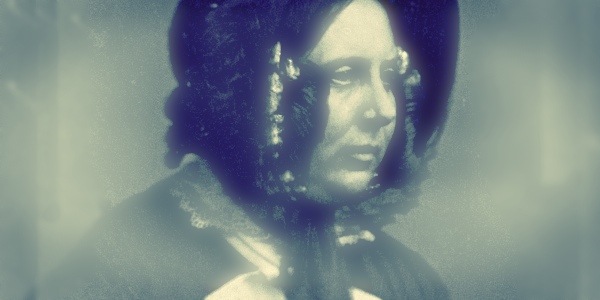You have no items in your cart. Want to get some nice things?
Go shoppingA middle-aged woman with a sad, plump face stands at the drawing-room window of 70 Gloucester Crescent, Camden-town, London. It is the year 1859, and she is 44 years old. Over the last 23 years she has borne her husband 10 children, and buried one: a wonderful tribute to her qualities as a mother, that only Dora died in infancy, though He sometimes chose not to see it that way. She also lost her darling sister Maria, aged just 17, within a few months of her first child’s birth: that was more than 20 years ago, now, but she still feels it, wishing gentle Maria was here to comfort her in her newly single state.[private]
She does not look like a figure of tragedy, this short fat woman in widow’s weeds: with her round face, sagging curls and soft jowls she is more like a minor comic character in a novel – sometimes sinister, sometimes pitiful, but always faintly ridiculous. It is not the fate of the fat to be tragic; they don’t suit it. When they are dying they still seem robust, gross even. As the portly gentleman or the corpulent lady coughs their last one cannot help feeling rather sorry for the poor pallbearers, which tends to rob the moment of its morbid grandeur. Do not expect posterity to mourn you, the obese dead, for it will not! Romantic death belongs to the thin and beautiful, like Maria; anyone else’s passing is usually more sordid than sorrowful. This sad fat woman, whose name is Catherine, does not expect to be mourned. She wonders whether He would even allow it. She has suffered much in her married life, and although it is over now, she feels as though her poor heart, stout as a little pony’s, has only just begun to break.
Why? This is why: she is standing at the window, drooping blue eyes glazed with tears, because she is listening to her two daughters singing. Their mingled voices rise like sweet perfume from the windows of the tall white house across the street, where they have their weekly music-lessons. Every Wednesday she stands just so, staring, straining until her eyes blur and smart, to try and catch a glimpse of them through the window. She has not spoken to her two girls, Mary and Kate, in over a year – or rather, they have not spoken to her. Or more precisely still, He has not let them. Her neighbours know her as Mrs. Hogarth, a widow – but Hogarth is in fact her maiden name. She does not use His name any more – it is too well-known by far – and so Miss Bates the music teacher has not the faintest idea that she is hosting her opposite neighbour’s estranged daughters, and that is how it must be.
Catherine sometimes becomes rather faint after standing so long at the window and has to sit down or ask Jane, her maid, to bring her a little water. But it is all worthwhile when she spies the girls entering and leaving the house (and it does feel like spying), their wide bright crinoline skirts swinging. She studies their fleeting faces anxiously for signs of unhappiness or ill-health, but to her relief and slight disappointment, there is none. It is as if they do not notice their mother’s absence at all. Indeed, they look so altogether well that they remind her of herself at 19; fresh, rosy-cheeked, with brown springy ringlets and laughter in their eyes. Catherine doesn’t wear the crinoline herself: it’s too much of a bother to keep up with fashion, and she feels broad and clumsy enough as it is. Besides, no skirt however voluminous could narrow by contrast her waist, thick with child-bearing, or shrink her matronly bosom.
But once, this frumpy dame was a pretty girl; one of the prettiest, her admirers said, in the whole of Edinburgh: blue-eyed, dark-haired, slender as a willow branch, with beautiful hands and dainty ankles. And she had her admirers, oh yes, back when William was on the throne and her husband-to-be was just a jobbing journalist, nosing around in Newgate and picking up criminal crumbs in the press-gallery of the Old Bailey. He wasn’t such a Great Man, then! Not so great as to resist a pair of sparkling eyes and a deep décolletage; not so high and mighty as to be above writing her love-letters full of exuberant, childish passion, with scores of kisses at the end. She had counted over forty at the bottom of one of them. She keeps His letters in a jewel-box in her cold, overlarge bedroom and does not look at them. They no longer seem to belong to her; she will give them to a library, or Museum, perhaps, upon her death, for He is already great enough that she knows some place or other will be interested in them. She will never sell them, no matter how straitened her circumstances become: she saves them so that, despite all His coldly defensive statements in the news-papers, all the gossip circulating among His friends, and the dreadful rumours in the yellow-press, the world may know that He loved her, once.
Her hands are still remarkable for their prettiness, or so Jane tells her. The only part of her which has stayed the same since girlhood, they are delicately plump and soft and white as two doves. Her fingers are long and well-formed, and she has not outgrown her wedding-ring, as so many fat women do. At least, not physically.
She also watches from this window when Charley is late back from the office, anxiously awaiting his return to dinner. Charley is her darling: her eldest child, her bright boy, her beloved son, and the only one of her children who has stayed with her, not Him. When they moved here, he was just 21 – the same age she was when she married – and so handsome; awfully like his father, but kinder, and softer about the eyes, like herself. A little crack opens up in her heart again as she thinks of him marrying, and leaving her.
Well! She will not stand in her son’s way, or hold him back, or drag him down, as He said she had done to Him. Had her husband not wanted a wife to tend the home and hearth: to bear His children, and arrange His meals, and fill His home with beauty and ease, and make it merry and bright? And hadn’t she done all that, and more? And lost her figure in so doing? You show her a woman who has borne 10 children and planned 10,000 suppers and dinners, whose husband can still fit his two hands about her waist as he could when they were first married! Even the dear Queen is no longer the slender girl of 20 years ago – because she, too, loves her husband.
He had blamed her for having so many children, but of course would never control His own urges, though she was so “fat and hideous”. Instead, He had seemed to expect her to use sponges and vinegar like a whore, to lessen the danger of conceiving. Well, she never had and never would! Did His actress-whore, the one He’d sent the bracelet to, wash herself out after? Catherine doubts it. She doubts it very much.
Catherine becomes very breathless and hot when she is angry, and so she has to sit down in the window-seat and close her eyes for a moment, and lean her sweating forehead against the cool of the glass. This is exactly why she always tried never to show anger in front of Him: He disliked any display of temper whatsoever from a woman, and it made her red in the face and even more conscious of her own ridiculousness. As if He, in his flying fits of passion, his big beard wagging and spittle flying, was not quite absurd! Very well, He was a genius, all the world agreed – but was it so terribly hard to write books? She had published one herself, eight years ago; she had wanted to know what it felt like. It was her last, ill-judged, clumsy attempt to understand Him, to find some common ground. “What Shall we have for Dinner?” was a cookery book, admittedly, but what else was she to write, after years of running His household? Besides, it had gone into several editions, and was still in print: she made a modest little annuity from the royalties.
A smile floats on her lips as she remembers one of the first recipes, for gammon and spinach, which He adored. She would make it for Him sometimes, as a late supper, when He was up till midnight working and Cook and the other servants were in bed. The gammon would be tender and blood-hot, and she would sauté the dark-green spinach leaves in butter until they wilted, with a pinch of salt and pepper and a shaving of nutmeg for flavour. He always said it was the best meal He’d ever tasted, and called her His “darling Kate”, and “Queen of the Kitchen”. But now when people said “gammon and spinach” they meant stuff and nonsense, tommyrot. When had that happened? When did the meanings of words change? Of gammon and spinach, richer and poorer, till death do us part?
She has never been a great novel-reader, Catherine; she was always too busy with the infinite and multitudinous duties of a mother and wife to spend much time lying on a chaise-longue with a three-volume shocker. But she has read all her husband’s books, and now, with her flat wide forehead pressed against the cold windowpane, and her rather prominent blue eyes shut tight in daydream, and her daughters’ voices throbbing like larks’ or thrushes’, her own aches and pains and sadness and heaviness drift away, become like breath and mist. She remembers her favourite book of her husband’s, and her favourite character in it: funny, round, slightly mad Miss Flite, and her attic full of songbirds who will never learn to fly. She remembers the silly sad names of them easily, like a chant learned in childhood: and she remembers thinking when she read them, that perhaps, for once, she knew what her husband meant.
Hope, Joy, Youth, Peace, Rest, Life, Dust, Ashes, Waste, Want, Ruin, Despair, Madness, Death, Cunning, Folly, Words, Wigs, Rags, Sheepskin, Plunder, Precedent, Jargon, Gammon, and Spinach.[/private]

About Sam Carter
Sam Carter is a reviewer and long-term student who has lived all round the world (currently in London). Stories have appeared in Liars' League London, New York & Hong Kong, "More than Medium" and anthologies from Leicester University and Arachne Press.





